Abstract
1. BAY u3405 (3(R)-[[(4-fluorophenyl) sulphonyl]amino]-1,2,3,4- tetrahydro-9H-carbazole-9-propanoic acid) has been evaluated on airway smooth muscle, from a number of species including man, for its thromboxane A2 (TXA2) antagonist activity. 2. BAY u3405 was a potent, and competitive, antagonist of the TXA2-mimetic U46619-induced contractions of human, guinea-pig, rat and ferret airway smooth muscle with pA2 values between 8.0 and 8.9 and with no inherent contractile activity (10(-9)-10(-4) M). 3. The TXA2 antagonist activity of BAY u3405 was stereoselective. Its (S)-enantiomer, BAY u3406, was approximately 50 fold less effective against U46619 on guinea-pig and human airway smooth muscle. 4. BAY u3405 also competitively antagonized contractions of guinea-pig airway smooth muscle induced by prostaglandin D2 (PGD2) or its metabolite 9 alpha, 11 beta-PGF2. On human and ferret airway smooth muscle it abolished contractions induced by PGD2, PGF2 alpha and 16,16-dimethyl-PGE2. 5. A high concentration (10(-6) M) of BAY u3405 had no effect on the contraction, or relaxation, of airway smooth muscle induced by a range of other agonists, nor did BAY u3405 have any effect on other prostanoid receptor types (DP, EP2, FP or IP). 6. BAY u3405, in contrast to some other TXA2 antagonists, is a potent and selective antagonist on a wide range of airways including human. This high affinity, and the oral activity of the compound described elsewhere, suggest it may be an appropriate tool to investigate the role of prostanoids in airway diseases such as asthma.
Full text
PDF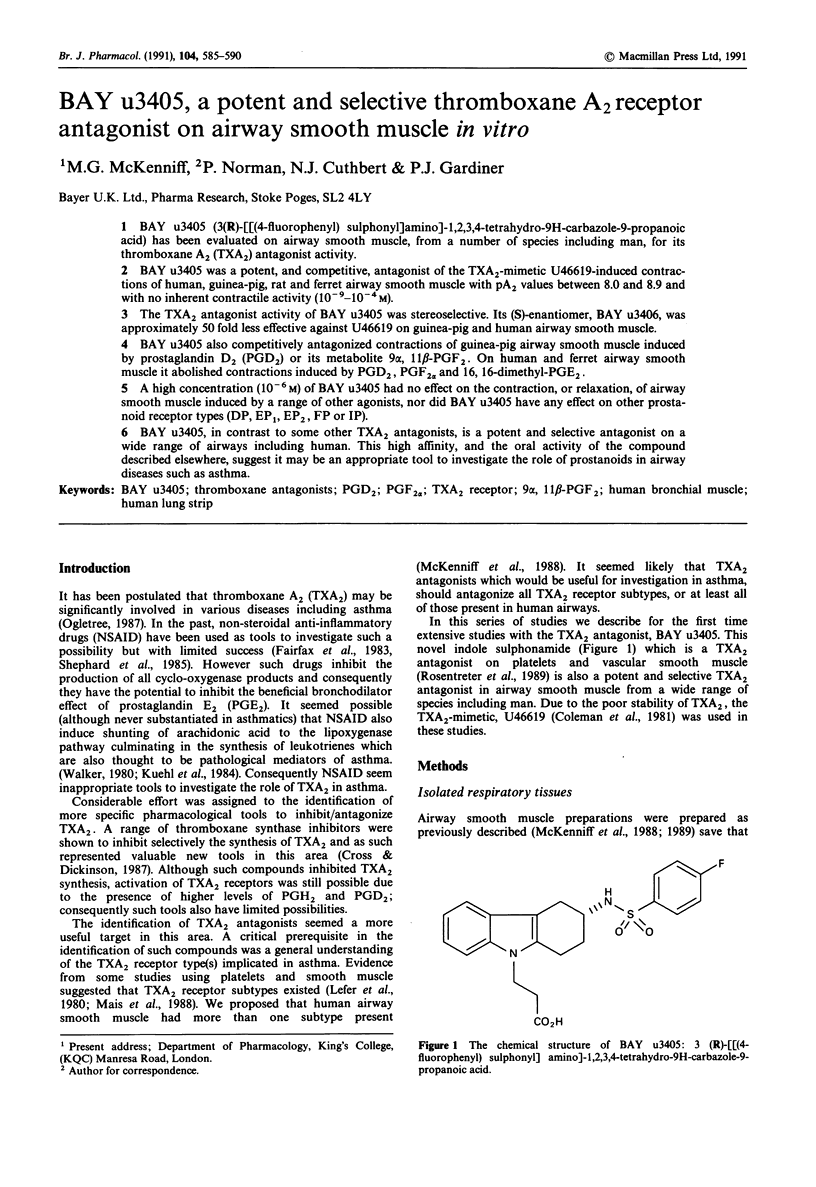
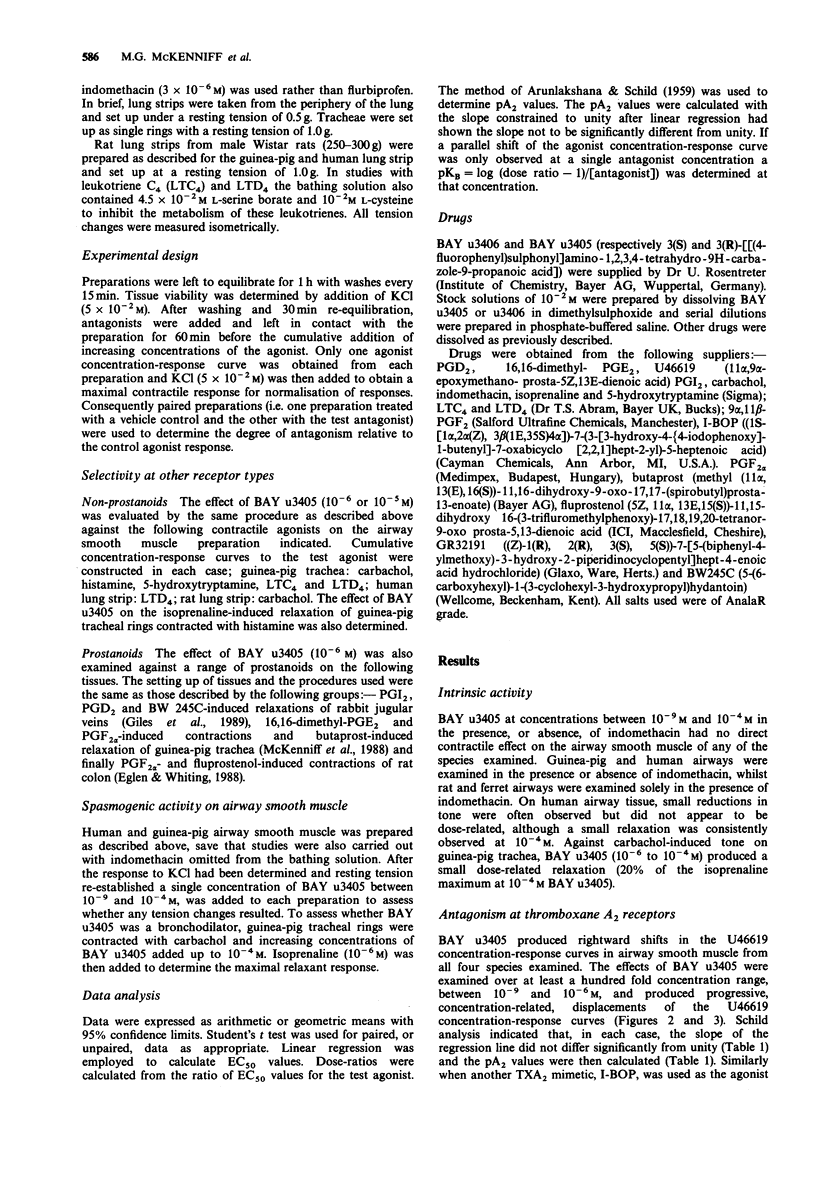
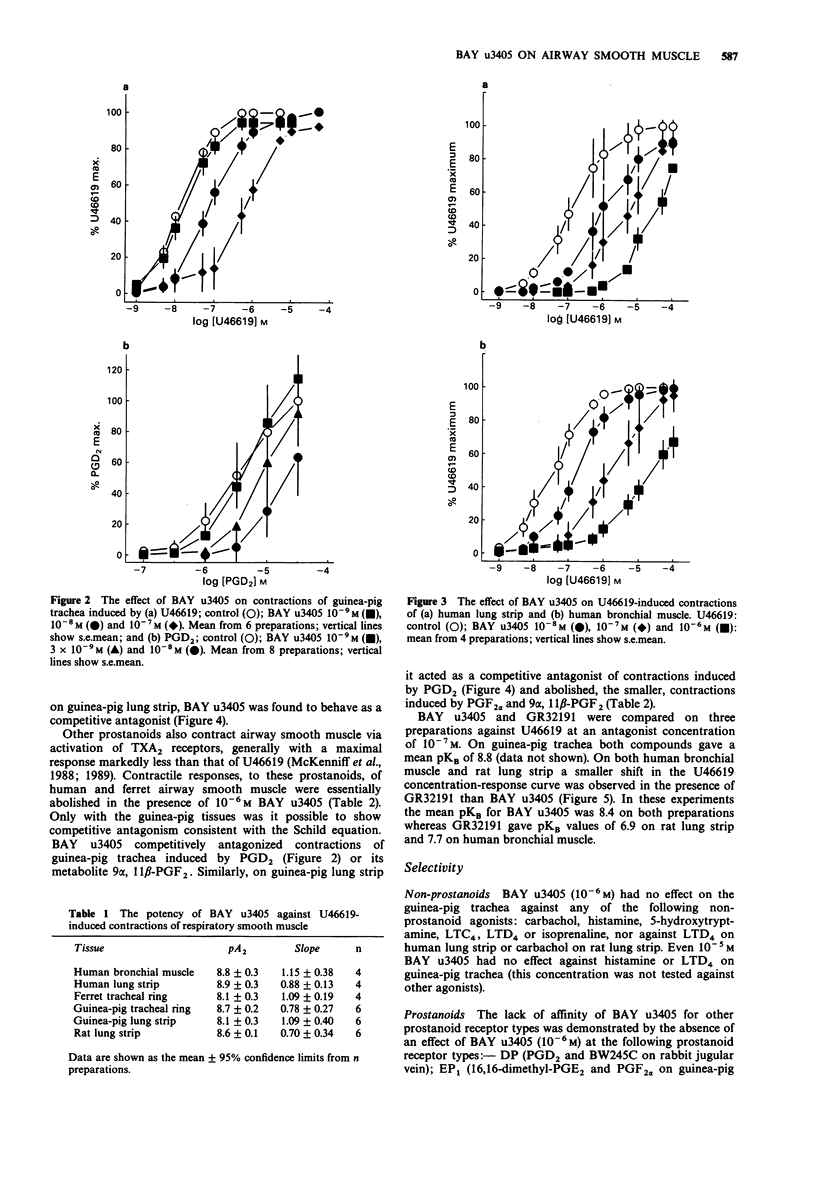
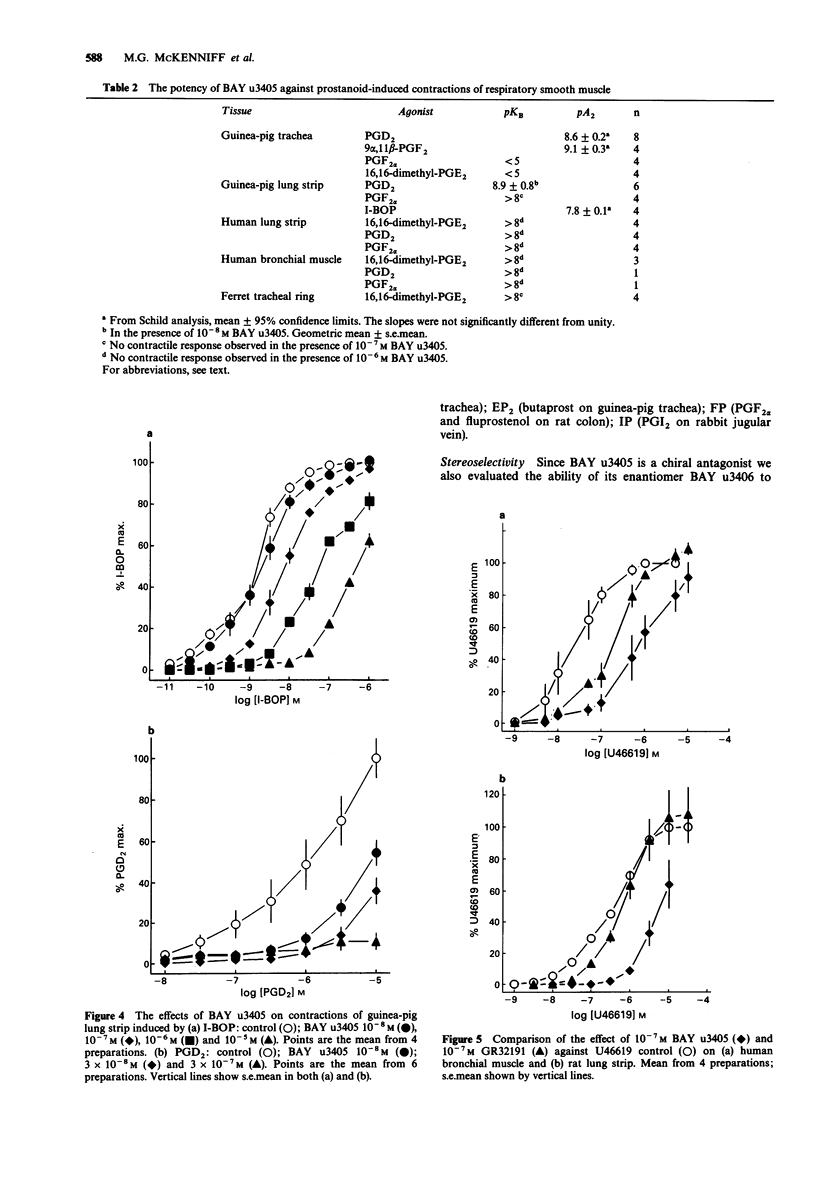
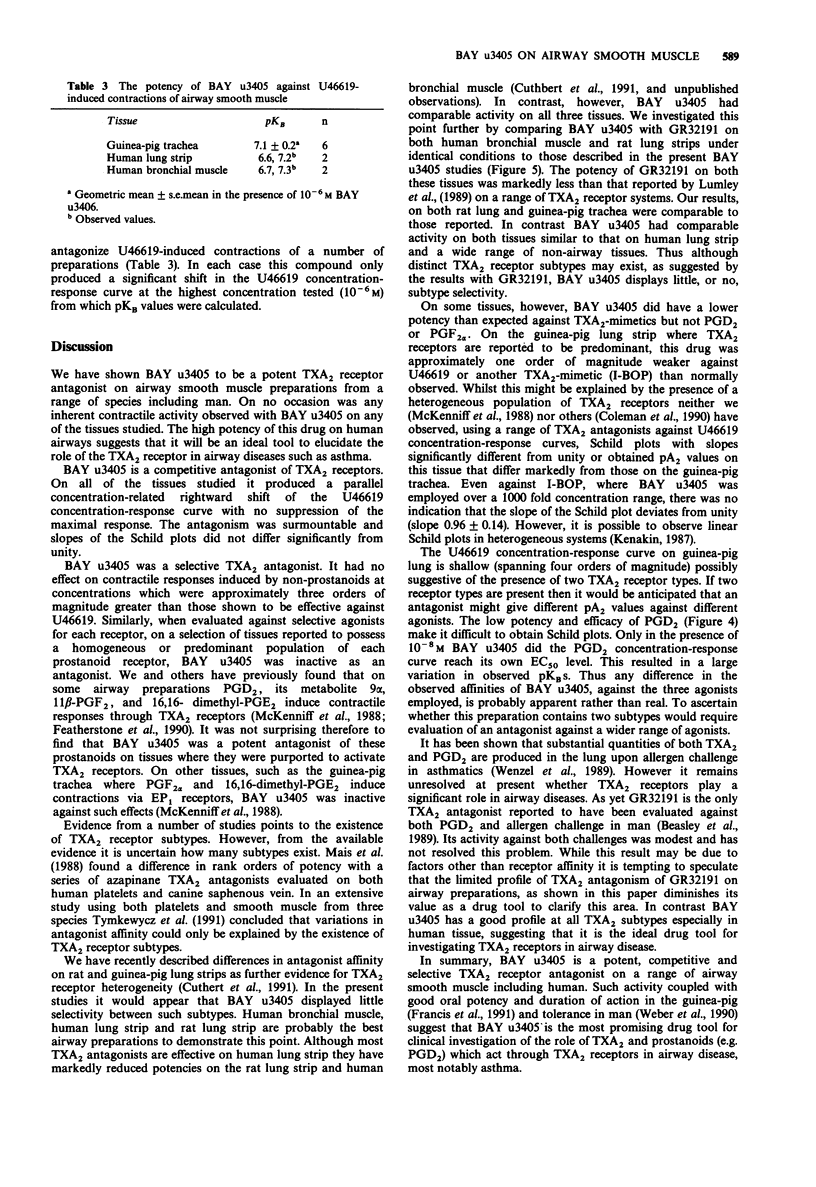
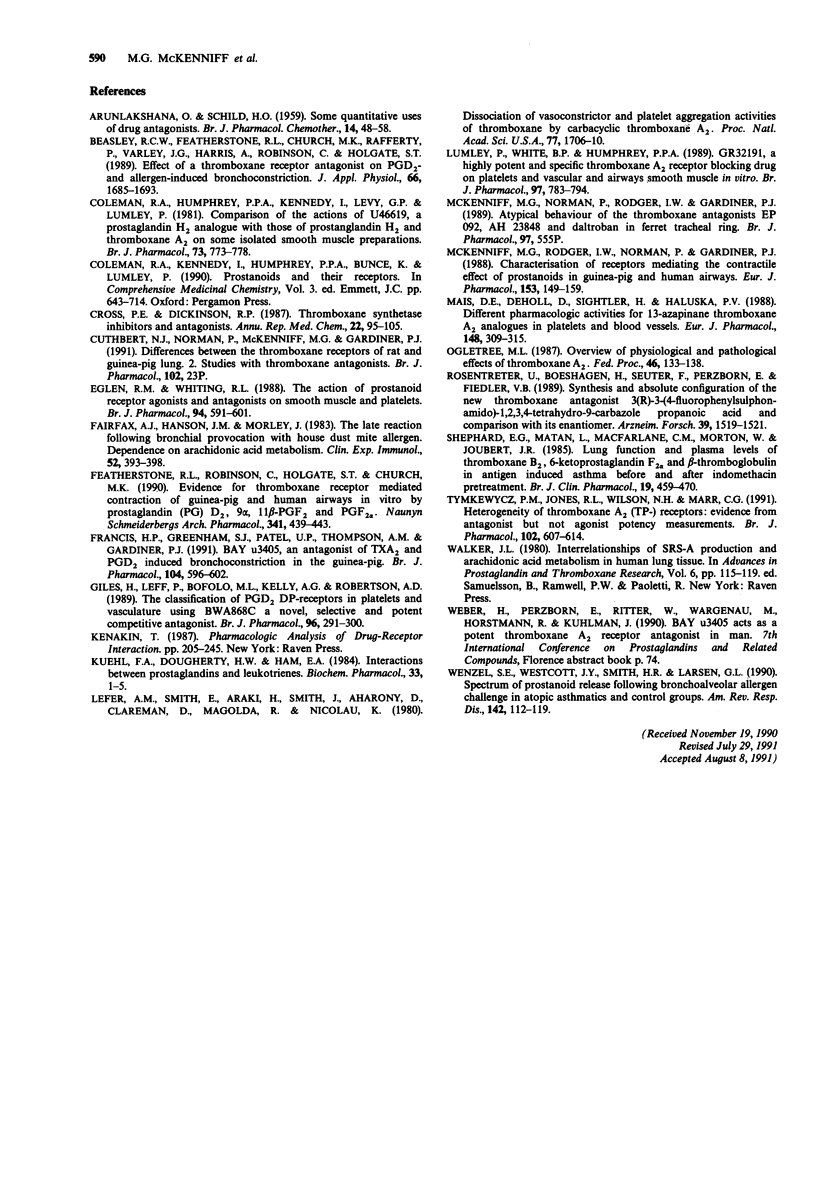
Selected References
These references are in PubMed. This may not be the complete list of references from this article.
- ARUNLAKSHANA O., SCHILD H. O. Some quantitative uses of drug antagonists. Br J Pharmacol Chemother. 1959 Mar;14(1):48–58. doi: 10.1111/j.1476-5381.1959.tb00928.x. [DOI] [PMC free article] [PubMed] [Google Scholar]
- Beasley R. C., Featherstone R. L., Church M. K., Rafferty P., Varley J. G., Harris A., Robinson C., Holgate S. T. Effect of a thromboxane receptor antagonist on PGD2- and allergen-induced bronchoconstriction. J Appl Physiol (1985) 1989 Apr;66(4):1685–1693. doi: 10.1152/jappl.1989.66.4.1685. [DOI] [PubMed] [Google Scholar]
- Coleman R. A., Humphrey P. P., Kennedy I., Levy G. P., Lumley P. Comparison of the actions of U-46619, a prostaglandin H2-analogue, with those of prostaglandin H2 and thromboxane A2 on some isolated smooth muscle preparations. Br J Pharmacol. 1981 Jul;73(3):773–778. doi: 10.1111/j.1476-5381.1981.tb16814.x. [DOI] [PMC free article] [PubMed] [Google Scholar]
- Eglen R. M., Whiting R. L. The action of prostanoid receptor agonists and antagonists on smooth muscle and platelets. Br J Pharmacol. 1988 Jun;94(2):591–601. doi: 10.1111/j.1476-5381.1988.tb11565.x. [DOI] [PMC free article] [PubMed] [Google Scholar]
- Fairfax A. J., Hanson J. M., Morley J. The late reaction following bronchial provocation with house dust mite allergen. Dependence on arachidonic acid metabolism. Clin Exp Immunol. 1983 May;52(2):393–398. [PMC free article] [PubMed] [Google Scholar]
- Francis H. P., Greenham S. J., Patel U. P., Thompson A. M., Gardiner P. J. BAY u3405 an antagonist of thromboxane A2- and prostaglandin D2-induced bronchoconstriction in the guinea-pig. Br J Pharmacol. 1991 Nov;104(3):596–602. doi: 10.1111/j.1476-5381.1991.tb12475.x. [DOI] [PMC free article] [PubMed] [Google Scholar]
- Giles H., Leff P., Bolofo M. L., Kelly M. G., Robertson A. D. The classification of prostaglandin DP-receptors in platelets and vasculature using BW A868C, a novel, selective and potent competitive antagonist. Br J Pharmacol. 1989 Feb;96(2):291–300. doi: 10.1111/j.1476-5381.1989.tb11816.x. [DOI] [PMC free article] [PubMed] [Google Scholar]
- Kuehl F. A., Jr, Dougherty H. W., Ham E. A. Interactions between prostaglandins and leukotrienes. Biochem Pharmacol. 1984 Jan 1;33(1):1–5. doi: 10.1016/0006-2952(84)90362-9. [DOI] [PubMed] [Google Scholar]
- Lefer A. M., Smith E. F., 3rd, Araki H., Smith J. B., Aharony D., Claremon D. A., Magolda R. L., Nicolaou K. C. Dissociation of vasoconstrictor and platelet aggregatory activities of thromboxane by carbocyclic thromboxane A2, a stable analog of thromboxane A2. Proc Natl Acad Sci U S A. 1980 Mar;77(3):1706–1710. doi: 10.1073/pnas.77.3.1706. [DOI] [PMC free article] [PubMed] [Google Scholar]
- Lumley P., White B. P., Humphrey P. P. GR32191, a highly potent and specific thromboxane A2 receptor blocking drug on platelets and vascular and airways smooth muscle in vitro. Br J Pharmacol. 1989 Jul;97(3):783–794. doi: 10.1111/j.1476-5381.1989.tb12017.x. [DOI] [PMC free article] [PubMed] [Google Scholar]
- Mais D. E., DeHoll D., Sightler H., Halushka P. V. Different pharmacologic activities for 13-azapinane thromboxane A2 analogs in platelets and blood vessels. Eur J Pharmacol. 1988 Apr 13;148(3):309–315. doi: 10.1016/0014-2999(88)90108-2. [DOI] [PubMed] [Google Scholar]
- McKenniff M., Rodger I. W., Norman P., Gardiner P. J. Characterisation of receptors mediating the contractile effects of prostanoids in guinea-pig and human airways. Eur J Pharmacol. 1988 Aug 24;153(2-3):149–159. doi: 10.1016/0014-2999(88)90601-2. [DOI] [PubMed] [Google Scholar]
- Ogletree M. L. Overview of physiological and pathophysiological effects of thromboxane A2. Fed Proc. 1987 Jan;46(1):133–138. [PubMed] [Google Scholar]
- Rosentreter U., Böshagen H., Seuter F., Perzborn E., Fiedler V. B. Synthesis and absolute configuration of the new thromboxane antagonist (3R)-3-(4-fluorophenylsulfonamido)-1,2,3,4-tetrahydro-9-carbazolepropan oic acid and comparison with its enantiomer. Arzneimittelforschung. 1989 Dec;39(12):1519–1521. [PubMed] [Google Scholar]
- Shephard E. G., Malan L., Macfarlane C. M., Mouton W., Joubert J. R. Lung function and plasma levels of thromboxane B2, 6-ketoprostaglandin F1 alpha and beta-thromboglobulin in antigen-induced asthma before and after indomethacin pretreatment. Br J Clin Pharmacol. 1985 Apr;19(4):459–470. doi: 10.1111/j.1365-2125.1985.tb02671.x. [DOI] [PMC free article] [PubMed] [Google Scholar]
- Stewart-Lee A. L., Maynard K. I., Lincoln J., Burnstock G. Sympathetic neurotransmission in the rabbit isolated central ear artery is affected as early as one week following a single dose of X-irradiation. Br J Pharmacol. 1991 Jan;102(1):23–26. doi: 10.1111/j.1476-5381.1991.tb12126.x. [DOI] [PMC free article] [PubMed] [Google Scholar]
- Tymkewycz P. M., Jones R. L., Wilson N. H., Marr C. G. Heterogeneity of thromboxane A2 (TP-) receptors: evidence from antagonist but not agonist potency measurements. Br J Pharmacol. 1991 Mar;102(3):607–614. doi: 10.1111/j.1476-5381.1991.tb12220.x. [DOI] [PMC free article] [PubMed] [Google Scholar]
- Walker J. L. Interrelationships of SRS-A production and arachidonic acid metabolism in human lung tissue. Adv Prostaglandin Thromboxane Res. 1980;6:115–119. [PubMed] [Google Scholar]
- Wenzel S. E., Larsen G. L., Johnston K., Voelkel N. F., Westcott J. Y. Elevated levels of leukotriene C4 in bronchoalveolar lavage fluid from atopic asthmatics after endobronchial allergen challenge. Am Rev Respir Dis. 1990 Jul;142(1):112–119. doi: 10.1164/ajrccm/142.1.112. [DOI] [PubMed] [Google Scholar]


